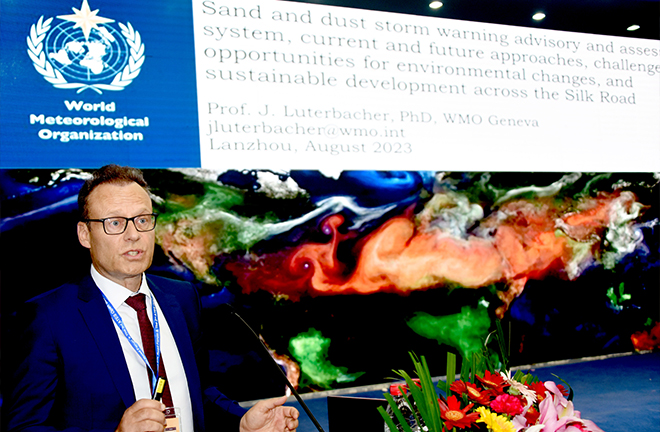Civilization and climate change are intertwined

ANSO Silk Road Forum & 2nd ATES Open Science Conference was held on August 23-25 in Lanzhou, Gansu Province. Photo: Sun Zifa/CNSphoto
The climate plays a fundamental role in supporting life on Earth. It has a direct influence on the development of human societies, and different climate conditions have shaped diverse human civilizations in different periods and regions. Today, humans and other organisms alike are facing serious challenges posed by climate change, which have become a public issue of global concern.
Humans seek to understand climate change primarily for two purposes. The first is to address future uncertainties by analyzing historical records of past climate shifts and monitoring its current state. The second is to clarify the relationship between climate change and human development.
Long-term change
Human civilization can be categorized as continental civilization or maritime civilization. The former is based on farming, nomadic pastoralism, hunting and gathering, and the latter is based on fishing and hunting. Climate is an important factor in the formation of both continental civilization and maritime civilization.
The ancient Chinese developed extensive climate knowledge that deeply influenced the rise of their civilization. Ancient Chinese texts such as Xia xiao zheng, Lüshi Chunqiu, Guanzi, and Huainanzi explained the impact of climate on farming to guide agriculture and governance. The Khmer Empire thrived because of its well-developed irrigation system that effectively utilized abundant rainfall.
Ancient Egyptians established an agricultural civilization based on their knowledge of the Nile River’s annual flood patterns, thus building a powerful, centralized state. However, it began to disintegrate with the onset of a severe drought around 2200 BC. Meanwhile, the generally mild climate on the European continent from the 3rd to the 6th century gave rise to the Eastern Roman Empire.
The “Little Ice Age” (approximately 15th-20th century) hindered the Spanish colonization of North America, while the Netherlands entered the era of maritime trade by taking advantage of the strong easterly winds. Throughout human history, climate change has often been accompanied by civilizational evolution. Human modes of production, lifestyles, and cultural behaviors reflect, to a large degree, the history of climate change.
Mitigation and adaptation
Humans have acquired climate knowledge through processes of both mitigation and adaptation, continually adopting new social behaviors conducive to their survival and development. Some past civilizations vanished amidst changing climate conditions, while others took adaptive measures and created new civilizational forms. Mitigation and adaptation are two basic approaches to dealing with climate change. Mitigation can be viewed as an urgent response to climate change, while adaptation comprises the longer-term survival strategy for coexistence with it.
Natural disasters pose some of the most direct and immediate threats climate change presents to human societies. Many ancient legends have described devastating floods attributed to shifts in climate. Apocryphal or not, these stories demonstrate how humans have long grappled with climate change. At present, the primary means of mitigating climate change is to reduce greenhouse gas emissions, delaying the disastrous consequences for humans and other species. The sustained development of human civilization through the long and arduous process of climate mitigation necessitates not only the consensus of all mankind, but also continuous scientific and technological advancements.
Across the centuries, civilizations have survived by continuously adapting to climate change. Societal transformation is inevitable when climate change broadly and profoundly impacts the living spaces of humans and other species. Coexistence with continuous climate change has become an inescapable reality that humanity must face. Developing effective mechanisms and pathways for climate adaptation poses a tremendous challenge for contemporary societies and globalized civilization.
Climate governance
Both mitigation and adaptation challenge the capabilities and performance of global climate governance. Three key aspects need to be stressed in modern climate governance.
First, it is important to look at climate change from an historical perspective. Climate change has been intertwined with human civilization since ancient times. It is both an environmental issue and a social issue. Human responses to climate change should be examined in the larger historical context, without ignoring the connection between climate change and human civilization throughout history. Both overconfidence and an excessive sense of inferiority should be avoided. Humans need to recognize the insignificance of their society in the Earth’s climate history, while actively responding to various crises linked with climate change.
Second, a sound modern climate governance system should be built. The IPCC, established in 1988, marked the establishment of a modern global climate governance system and provides a scientific foundation for climate mitigation and adaptation. However, it remains to be seen whether governance methods built upon modern monitoring systems are capable of effectively dealing with the various uncertainties caused by climate change. Society needs to continue exploring and establish a more targeted and adequate modern climate governance system.
Third, it is necessary to build a global climate governance community. The first World Climate Conference was held in 1979, making climate change an international public issue, and climate governance a global common affair. From the UNFCCC signed in 1992 to the Kyoto Protocol adopted in 1997, then the 27th Conference of the Parties of the UNFCCC held in 2022, the international community has reached a certain degree of consensus on addressing climate change. The world should realize that humans and nature coexist as a community of life, and humanity should unite to form a climate governance community in order to effectively tackle climate change.
Luo Qiao is an associate professor in the School of Public Administration at Guizhou University of Finance and Economics.
Edited by WANG YOURAN
